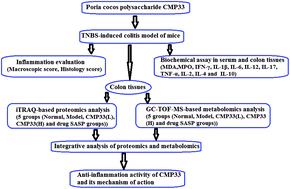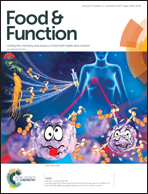The protective effects of Poria cocos-derived polysaccharide CMP33 against IBD in mice and its molecular mechanism†
Abstract
In this study, the protective effects of a carboxymethyl polysaccharide CMP33 from Poria cocos against inflammatory bowel disease (IBD) were investigated using TNBS-induced colitis in mice. The results showed that CMP33 markedly ameliorated the severity of colitis, including a 2-fold decrease in the mortality rate, a 50% decrease in disease activity index, and a 36%–44% decrease in macro- or microscopic histopathological score, compared with TNBS administration. Moreover, CMP33 decreased the levels of pro-inflammatory cytokines and increased the levels of anti-inflammatory cytokines in the colon tissue and serum of colitic mice. Using iTRAQ-coupled- nano-HPLC-MS/MS-based proteomics, the protein profiles after TNBS, high- or low-dose CMP33 and salazosulfapyridine (SASP) treatments were compared and many differentially expressed proteins were identified. Among them, 7 proteins (Hmgcs2, Fabp2, Hp, B4galnt2, B3gnt6, Sap and Ca1) were proposed to be the common targeting protein group (TPG) of CMP33 and drug SASP. Particularly, some targeting proteins were CMP33-dose-specific: high-dose-specific TPG (Mtco3, Gal-6, Mptx, S100 g and Hpx) and low-dose-specific TPG (Zg16, Hexb, Insl5, Cept1, Hspb6 and Ifi27l2b), suggesting the complex acting mechanism of CMP33. GC-TOF-MS-based metabolomics revealed that oleic acid and dihydrotestosterone could be the common targets of CMP33 and SASP. By integrative analysis of proteomics and metabolomics, key protein–metabolite pathways (PMP) were identified, PMP for high-dose: 2-hydroxybutyric acid – (GPT, GGH) – glutathione – ALB – testosterone – TTR – dihydrotestosterone; PMP for low-dose: (PYY, FABP2, HMGCS2) – oleic acid – TTR – dihydrotestosterone. In total, these results demonstrated the protective effects of CMP33 against IBD in mice through the potential TPG and PMP.



 Please wait while we load your content...
Please wait while we load your content...